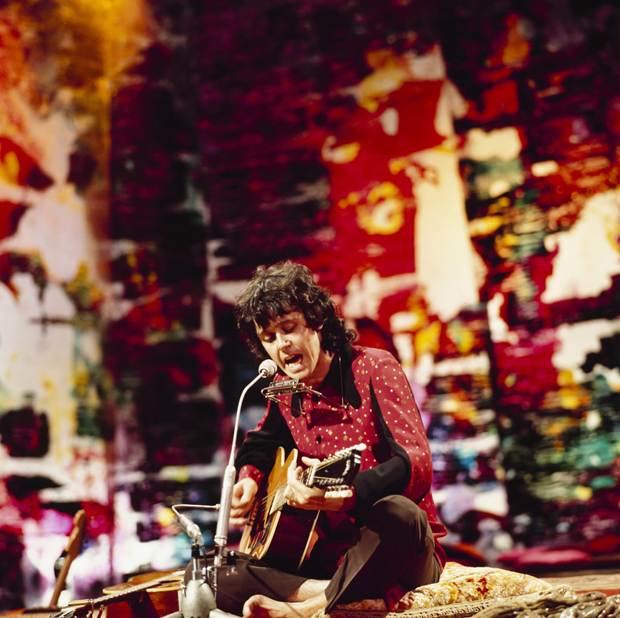Donovan on Working with Beatles, Beck and Page — and Welcoming Jimi Hendrix to the UK
All the latest guitar news, interviews, lessons, reviews, deals and more, direct to your inbox!
You are now subscribed
Your newsletter sign-up was successful

He’s a famous Sixties folk-pop troubadour who worked with Jimmy Page and played with the Beatles. But what Guitar World readers really want to know is…
What do you call your unique picking technique, and which artists inspired it? — Dingy Bell
It's called the claw-hammer, and it comes from the Carter family and Maybelle Carter, who's called “Mother” Maybelle now. In the Twenties, she transposed a banjo-picking style to guitar so there’d be a walking bass on the guitar. I learned it from a guy called Dirty Hugh. And I learned it well.
I know you taught John Lennon the picking style heard on the Beatles’ “Dear Prudence” and “Julia.” Which one of your own songs best exemplifies this technique? — Cindy Moorhead
That early folk style, which I taught John and he adapted, would be in a song of mine called “To Try for the Sun” from the Fairytale album from 1965. It’s actually played with a capo. John plays a very clean, basic fingerstyle on “Dear Prudence” and “Julia.” He became quite proficient at it very quickly, and he developed his own style.
What can you tell me about your original 1965 Gibson J-45 and Gibson’s new limited-edition 1965 J-45 Donovan model? — Sal Jennings
I bought it on Sunset Boulevard, probably for 300 bucks. I wrote every song on it from late 1965 into ’70, when it was stolen during a college-town gig. The security was nil then. I kind of remember a guy walking in and saying, “Hi, we’re looking forward to the concert,” and then wondering later where the hell my guitar was. So I was speaking to Peter Leinheiser from Gibson two years ago, and I said, “My little J-45 still hasn’t turned up.” I think he said, “You’re being inducted into the Rock and Roll Hall of Fame. Why don’t we make you one?”
All the latest guitar news, interviews, lessons, reviews, deals and more, direct to your inbox!
When it was offered, I said, “I'd like it exactly the same, really the same.” The chief luthier said, “We’ll make you a prototype right away.” I said, “Great, but you’ll need an original.” So I found one in Ohio. I was playing it, and it all came back to me. Old tunes came out that I used to play on my old J-45. It was very touching, a wonderful feeling. And then there was the feeling of, How can you repeat this? I sent it to Gibson, and they said, “We can make it louder.” I said, “No.” They said, “We can make the body deeper.” I said, “No, just go back to the original.” The only change they made was that the new one has a pickup. It’s a very fine guitar.
What are your memories of working with Jimmy Page? — Tad Poole
He walked in—he was a session guy [on “Sunshine Superman”]. He did the session and we liked each other. That was as quick as it was. My father worked with me for a while, because I was underage and couldn’t sign contracts. I loved my father; he taught me a lot about poetry and stuff. And he kept everything. He gave me a box of papers that he kept, and in the papers was something from a Jimmy Page session: “Jimmy Page, £3.10.” It was amazing.
Did you ever meet Jimi Hendrix? — Johnny Cola
When we got into the music business, Gypsy Dave [Gyp Mills], my road buddy since we were 16, and I used to hang out with the Animals. Gypsy was dating Yvonne, a Swedish girl, and [Animals bassist] Chas Chandler was dating another Swedish girl, the friend of Gypsy’s Swedish girl. It seems a lot of rock bands were dating Swedish girls in the Sixties! So one day, we’re sitting around—me, Gypsy and Yvonne—and a call came in.
It was Chas, and he said to Gyp, “You’ve got to get in a taxi and get to Heathrow. I’m picking up a guitar player from New York. He’s fucking amazing.” So Gypsy finally arrives at this horrible hotel we were staying in because we were busted and couldn’t go back to our apartment [laughs], and there was Jimi. He was thin, had an afro, a matchbox suitcase and a Fender guitar. We were the first to welcome Jimi to England.
What was it like working with Rick Rubin on the [1996] Sutras album? — Scott Devon
When we met, he asked me, “How did you make records in the Sixties?” I said, “We did three songs in three hours and an album in a week.” He said, “That’s why it sounds so ‘live.’ Let’s make a record like that.” As soon as we went into the studio, the guy put up baffles and Rick said, “No baffles. They didn't have baffles in the Sixties. We’re going to do three songs a day, an album in a week.” It took three years! He became fascinated with the songwriting process. He’d ask me, “How did you write ‘Hurdy Gurdy Man’?” and things like, “You'd just pick up a book and write a song?”
So he asked me to go to Book Soup [book store] in L.A. every day. When I’d play him the new songs, if he moved his leg this way, the song was on the “maybe” list. When he tapped this foot, it was “I don't think so.” I got the code. He never said much. Over three years, I realized how meticulous he was. He stripped it all down. One day he played me demo recordings of Johnny Cash playing acoustic guitar. He asked me, “What do you think?” I said, “I like them. I think they’re amazing.” I’d never heard Johnny with one vocal, one guitar. And of course, we know what happened [Cash’s Grammy-winning 1994 album, American Recordings]. He said, “I like your demos too.” And the album became an event.
Who’s the best guitarist you’ve ever worked with? — Arnold Stang
I think I've worked with everyone in Britain except Eric Clapton. But it’s hard to say, because, really, we’re talking about sessions, and there were overdubs. But I have to say that, in terms of improvisation, which takes into account my love of jazz, it would be “Barabajagal” and Jeff Beck.
Can you describe the session when you recorded “Barabajagal” with Jeff Beck? — Damien Linotte
It was incredible. Mickie Most said, “We’ll ask Jeff and bring the whole Jeff Beck Group in.” So they had a night off and I had a session. Mickie said to me, “We’re just going to play the song to the band once, and then we’re going to record.” So everyone was there waiting around, and Mickie said, “Well, where the fuck’s Jeff?” And then Jeff walked in, and it was like Spinal Tap.
He came in and sat down with everybody else. We waited, and we waited, and Mickie said, “Okay, Jeff get your guitar out.” So Jeff’s looking around like, “Where’s my guitar?” All the instruments have been hired—nobody had brought, and nobody had thought! His guitar's locked up somewhere in the van on the road.
Mickie goes, “No guitar, Jeff? What are we gonna do?” Jeff says, “Just call somebody and get a Strat.” Suddenly the whole of London is looking for this Strat for Jeff. And of course, everybody wants to get it to him—and one arrives. Later on, I stayed at a house in L.A. that [comedian] Tommy Smothers was staying in. He said, “Let me launch ‘Barabajagal’ at a party.” He invited everybody, and he said, “Ladies and gentlemen, we’re here to honor a new recording from an artist we all know, and here it is. Who do you think it is?” Nobody could figure it out. It was the most unusual single I had made at the time.
Which Donovan album are you most proud of? — Sweet Sassy Molassy
It has to be Sunshine Superman. We didn't quite know where it would sit in history, but Gypsy and I knew it was something, and Mickie Most realized it when I was sued because Alan Klein did the right thing and took me from Pye Records and put me with Clive Davis. I was the first signing with Clive Davis with Epic/Columbia.
But it wasn’t understood at the time that the album was “before its time,” and then it was held up, and we were busted in London [Donovan was the first popular British musician to be arrested for possession of pot], and the album hung about for seven or eight months. When I was inducted into the Rock and Roll Hall of Fame, they said, “Donovan single-handedly initiated the psychedelic revolution with Sunshine Superman.” It was made in late 1965 and early 1966, well before Sgt. Pepper, well before [the Jefferson Airplane’s] “White Rabbit” and all that stuff.
Is it true that you contributed a line to the Beatles’ “Yellow Submarine”? — Shannon Thornton
Yes. By then I was known for writing what’s called children’s songs, but really they are fantasy-legend-myth-imagination songs. [Paul] McCartney knew this, and he seemed to have a gap, a hole, in one of his songs. I asked him what he was writing, and he said, “I've got this thing called ‘Yellow Submarine,’ and I don’t know what to do here.”
And I thought, Paul McCartney is asking me for a line in one of his songs. I'd heard that this had happened: Ringo gave words, [Beatles roadie] Mal Evans gave a couple of words now and again. And I said, “Okay, give me a moment.” I went in the other room and came back with “Sky of blue and sea of green/in our yellow submarine.” I reworked lines he already had. He said, “That'll do.” So that was one of the very rare occasions when more than one word was written by another songwriter on a Beatles song.
I’ve heard you sometimes offer guitar lessons in person or online. What’s the latest with that? — Campbell McAlpine
Yes. If you visit my web site, donovan.ie, there’s a way to contact me for master classes [support@donovan.ie]. I’m thinking of doing them in the Bahamas, so it’ll be a vacation for people as well. I’ll also be presenting certain basics online, but this one-on-one, face-to-face master class is something I’m really looking forward to. I enjoyed doing it once before. I’ll be showing things besides the Beatles tricks. I’ve got some other ones I didn’t teach them! It’s called Donovan Master Class Composition and Guitar Style. It’ll be about composition—how to allow songs to happen.

Damian is Editor-in-Chief of Guitar World magazine. In past lives, he was GW’s managing editor and online managing editor. He's written liner notes for major-label releases, including Stevie Ray Vaughan's 'The Complete Epic Recordings Collection' (Sony Legacy) and has interviewed everyone from Yngwie Malmsteen to Kevin Bacon (with a few memorable Eric Clapton chats thrown into the mix). Damian, a former member of Brooklyn's The Gas House Gorillas, was the sole guitarist in Mister Neutron, a trio that toured the U.S. and released three albums. He now plays in two NYC-area bands.
